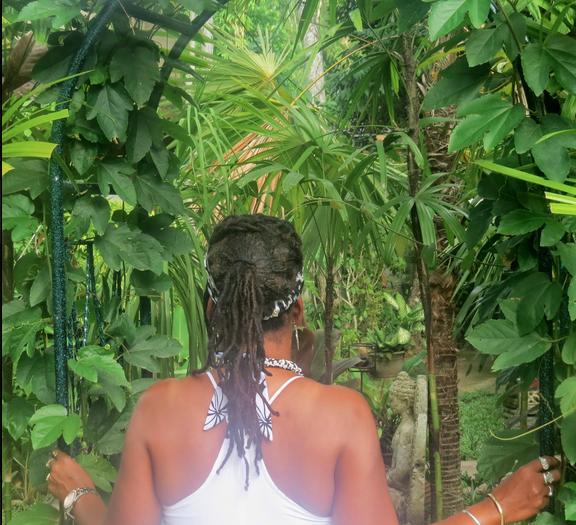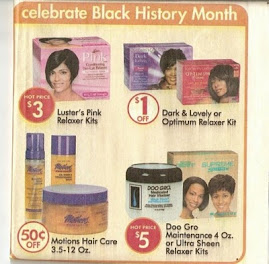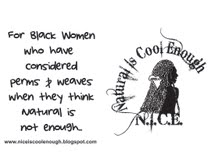First, let me begin by saying that I have been talking about Natural Hair in the Northeast over the past week during a talk that I gave at Columbia University Teachers College, which was very enjoyable, (both the audience and giving the talk) followed by serving on a panel at the Black PhD Network, where I spoke on a Diversity and Inclusion Panel, of which natural hair was surely part of the dialogue. I was on a panel at the latter with Dr. Julianne Malveaux, President Emerita of Bennet College and Dr. Kittles, one of the co-founders of Ancestry.com, the company that traces folks roots, via genetic testing. That was a wonderful experience!!!
http://www.asiamnaturally.com/glossary.html I am going to make an attempt to clarify some of these terms, in a straightforward manner, hoping we can stop talking about our hair without the necessity of a full glossary so my thoughts are below.
First, here are the brochures of the two wonderful events I attended. Thanks to any and everyone who was there and bought my books and N.I.C.E. t-shirts (10% of all proceeds will go to a homeless organization for the shirts)!
Now to, Clarification of the Natural Hair Glossary:
All of the terms for length, including armpit, collar bone length, etc., does not seem to be necessary. Your hair is either short or long or something in between. The same goes for the Big or the Teeny Weeny Afro. It's just short or big, that's all. As for Baggy, there is no way to make this sound cute or important. It's a term to describe that you are just sleeping with a plastic bag on your head to keep moisture from getting on the pillow. The Big Chop or BC is just cutting your hair, that's all. Cutting out perm is usually the case. There is nothing big about it. You're just cutting your hair. BSS for Beauty Supply Store is just a place that sells hair care products and all kind of other hair and non-hair related products. These kind of stores are plentiful in Black communities and are rarely run or owned by Black people but they make a lot of money. Creamy crack is just a term for relaxers. I believe the term emerged from Chris Rock's film called "Good Hair." And while we are at it, can we eliminate the term relaxer? There is nothing relaxing about putting deleterious chemical on our scalps and hair, which often leads to burns and loss of hair. Holy grail is a term used to describe finding a hair product that really works nicely on natural hair but maybe that term is a bit much as per the terms origins, it refers to a bowl or dish. I must admit I've been guilty of using this term to describe shea butter and in a blog post/contest, but I think that is going too far since there is really nothing holy about it. It's just good, natural and from Africa so I like it. Nappyersary/Nattyversary is a term to describe the anniversary of the day one decides to go natural. Really? Seriously? I won't comment on this. Let's just not have that term. Pineappling is when one pulls their hair on top of their head in puffs (one or two). Can we just not refer to our hair as fruit? Protective styling is used when someone adds weave, perm or a wig to protect their actual hair. Let's be honest. There is no need for protection. This is merely a term to justify the perm, weave, etc. The word that ticks me off the most is transitioning. This term supposedly refers to gradually going from non-natural hair (perm, weave, etc.) to natural (wearing your hair as it grows out of your scalp). The reality is that one is not transitioning but merely being true to who/she is, naturally.
The bottom-line is that we don't need a glossary to support/explain all that is done with our beautiful, natural hair. It's odd at worst and cumbersome at best to have all of these terms to explain/justify our natural hair actions. Let's just be natural and know that Natural Is Cool Enough. That's N.I.C.E.!
http://www.asiamnaturally.com/glossary.html I am going to make an attempt to clarify some of these terms, in a straightforward manner, hoping we can stop talking about our hair without the necessity of a full glossary so my thoughts are below.
First, here are the brochures of the two wonderful events I attended. Thanks to any and everyone who was there and bought my books and N.I.C.E. t-shirts (10% of all proceeds will go to a homeless organization for the shirts)!
Now to, Clarification of the Natural Hair Glossary:
All of the terms for length, including armpit, collar bone length, etc., does not seem to be necessary. Your hair is either short or long or something in between. The same goes for the Big or the Teeny Weeny Afro. It's just short or big, that's all. As for Baggy, there is no way to make this sound cute or important. It's a term to describe that you are just sleeping with a plastic bag on your head to keep moisture from getting on the pillow. The Big Chop or BC is just cutting your hair, that's all. Cutting out perm is usually the case. There is nothing big about it. You're just cutting your hair. BSS for Beauty Supply Store is just a place that sells hair care products and all kind of other hair and non-hair related products. These kind of stores are plentiful in Black communities and are rarely run or owned by Black people but they make a lot of money. Creamy crack is just a term for relaxers. I believe the term emerged from Chris Rock's film called "Good Hair." And while we are at it, can we eliminate the term relaxer? There is nothing relaxing about putting deleterious chemical on our scalps and hair, which often leads to burns and loss of hair. Holy grail is a term used to describe finding a hair product that really works nicely on natural hair but maybe that term is a bit much as per the terms origins, it refers to a bowl or dish. I must admit I've been guilty of using this term to describe shea butter and in a blog post/contest, but I think that is going too far since there is really nothing holy about it. It's just good, natural and from Africa so I like it. Nappyersary/Nattyversary is a term to describe the anniversary of the day one decides to go natural. Really? Seriously? I won't comment on this. Let's just not have that term. Pineappling is when one pulls their hair on top of their head in puffs (one or two). Can we just not refer to our hair as fruit? Protective styling is used when someone adds weave, perm or a wig to protect their actual hair. Let's be honest. There is no need for protection. This is merely a term to justify the perm, weave, etc. The word that ticks me off the most is transitioning. This term supposedly refers to gradually going from non-natural hair (perm, weave, etc.) to natural (wearing your hair as it grows out of your scalp). The reality is that one is not transitioning but merely being true to who/she is, naturally.
The bottom-line is that we don't need a glossary to support/explain all that is done with our beautiful, natural hair. It's odd at worst and cumbersome at best to have all of these terms to explain/justify our natural hair actions. Let's just be natural and know that Natural Is Cool Enough. That's N.I.C.E.!





























